$18 billion. That’s not a typo. It’s the estimated amount of money online retailers lose annually due to abandoned shopping carts.
This jaw-dropping figure represents potential sales that vanished into thin air, leaving businesses scratching their heads and wondering where it all went wrong.
Let’s take a closer look at the cart abandonment statistics and uncover the numbers that are reshaping the e-commerce market.
Top Highlights
50% of people leave their carts if discount codes don’t work
69.57% of carts are abandoned globally.
68.3% of carts are abandoned in the fashion and clothing industry.
More than 50% of shoppers leave their carts because of extra costs.
73.07% of carts are abandoned when shopping on desktops.
48% of business buyers leave their carts because there aren’t enough payment options.
20% of people finish buying something after seeing a popup.
28% leave if checkout is too hard.
The Billion-Dollar Problem

Cart abandonment remains a major issue, causing significant global revenue losses. The rate of cart abandonment has fluctuated over recent years.
1. In 2023, the global online shopping cart abandonment rate reached 70.19%, crossing the 70% mark for the first time in a decade.
2. This rate has been growing constantly, rising from 68.07% in 2014 to 69.99% in 2022.
Improvements in technology, mobile optimization, and customer support have been helpful in reducing these losses, but there is still a long way to go.
Why Customers Leave
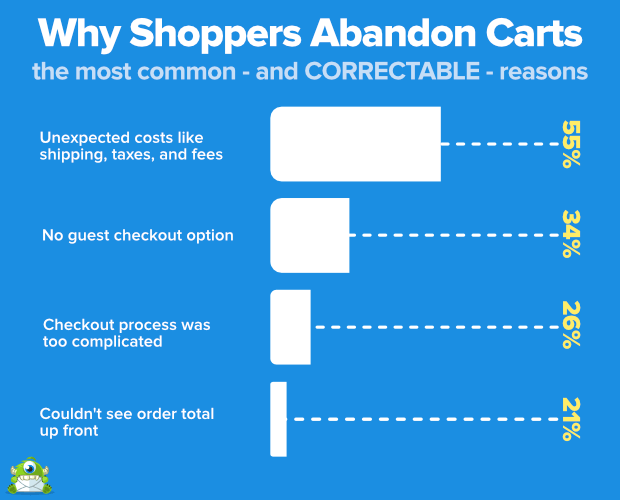
Cart Abandonment can be influenced by factors such as unexpected costs, complex checkout flow, price comparisons, or security concerns.
Additional fees, such as convenience fees and shipping costs, can be disappointing to many consumers.
3. 55% of users abandon their carts due to unexpected charges that were not mentioned while selecting the product.
4. 17% of people do not trust industries with their personal or credit card information. They also believe that they could be abandoned after making the purchase.
5. 23% of customers said that the delivery of the article was too slow, which resulted in the product being abandoned in the cart.
6. 13% of online shoppers abandoned their carts since they could not find enough payment options that they wanted to choose.
7. 46% abandon carts because a discount code doesn’t work
8. Around 90% of customers use discount coupons, and 75% of people expect brands to offer them.
9. However, 46% of users will abandon their carts when they encounter issues with discount codes that don’t work.
Offering codes can be a good idea, but you need to make sure that they work correctly.
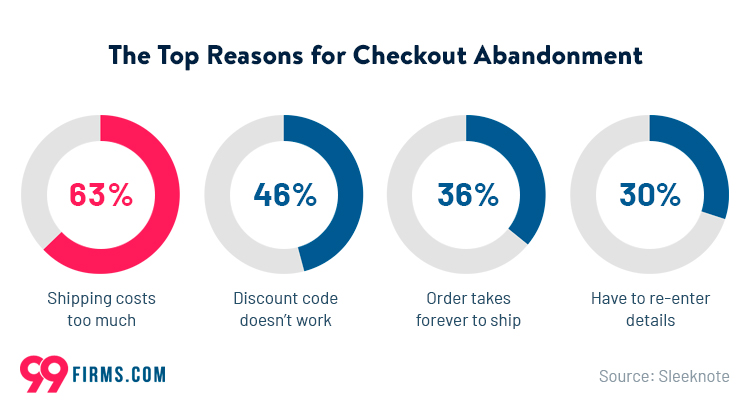
10. More than 50% of customers abandon their carts if the checkout process takes longer than 30 seconds.
11. 17% of consumers leave in between purchases due to complicated checkout processes.
Must Read: 12 Actionable Tactics to Increase Checkout Conversion Rates
12. A study from YOTTAA shows that 9 out of 10 shoppers will abandon their carts if the site takes too long to load.
Cart Abandonment Benchmarks
13. Around 41 studies suggest that 69.57% of customers abandon their carts before making a purchase.
14. Although this rate varies from brand to brand, it is usually between 60 to 80%.
The shopping cart abandonment rate depends on industries, products, and businesses.
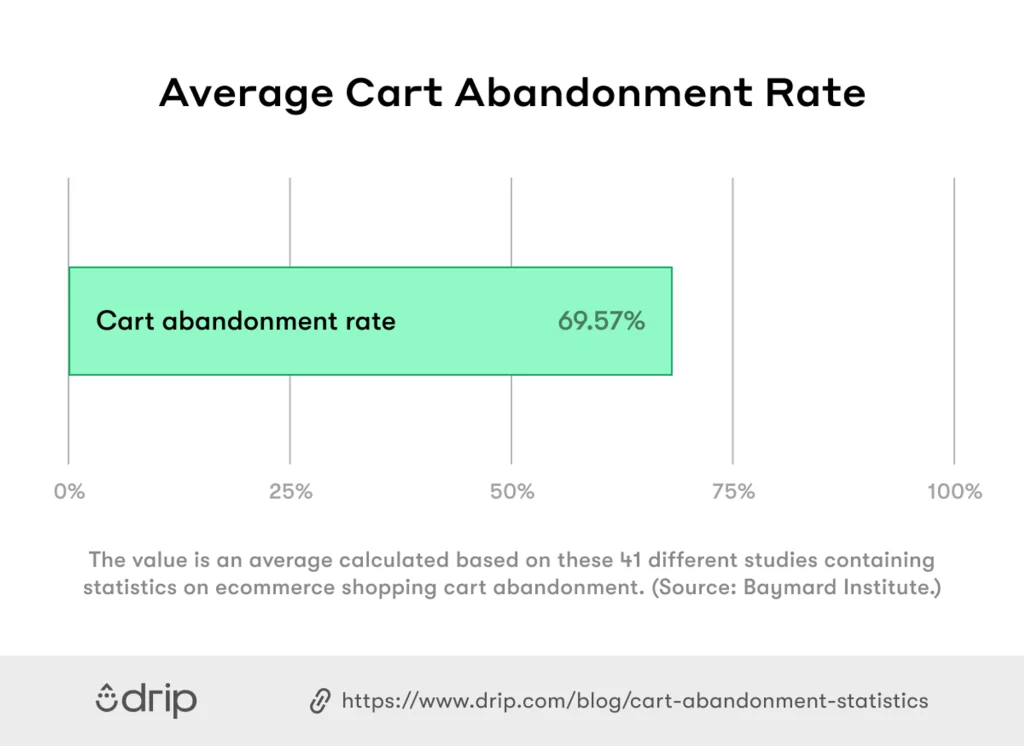
15. 24% of users abandon their shopping carts because they were asked to create an account. This request is found off-putting for many consumers.

16. According to Forrester Research, $18 billion in annual sales revenue is lost to cart abandonment every year.
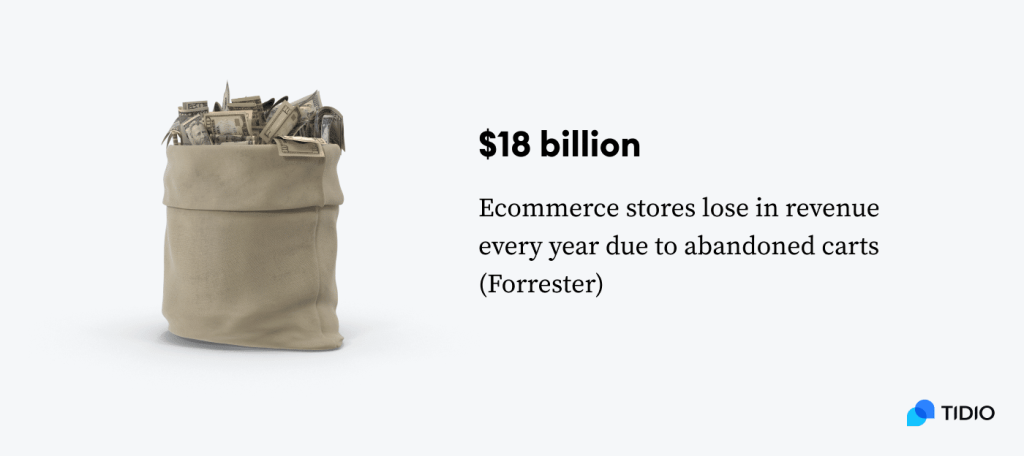
17. 79% of users buy products online using their phones. Optimizing the checkout page can help avoid cart abandonment.

Average Cart Abandonment Rates Across Industries & Devices
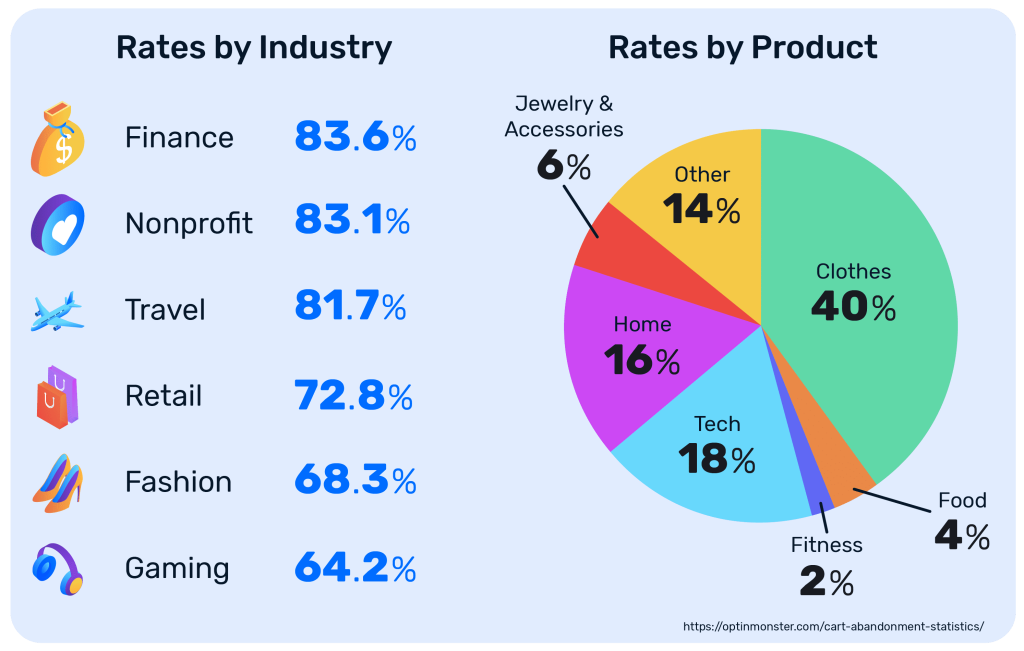
Shopping Cart abandonment rates vary across different industries, influenced by the nature of the products and consumer behavior.
18. For example, multi-brand retail is at 67.33%, food and beverage is at 38.16%, consumer goods is at 33.59%, and so on.
Shopping cart abandonment statistics also vary by region and culture, reflecting differences in consumer expectations, payment preferences, and shopping habits.
In regions where mobile shopping is predominant, optimizing mobile experiences is crucial to lowering abandonment rates.
Having region-specific payment options can lower cart abandonment stats.
Global E-commerce
Shopping cart abandonment is a serious issue in global e-commerce. Certain factors, such as unexpected costs, security concerns, and mobile optimization, can cause such challenges.
Below are the statistics describing this:
19. Finance products are complicated, and one needs to understand them properly. Because of this, the shopping cart abandonment rate is 83.6%.
Also see: 10 Best Cart Abandonment Software – Top Picks for 2025
Popups can convert cart abandonment rates.
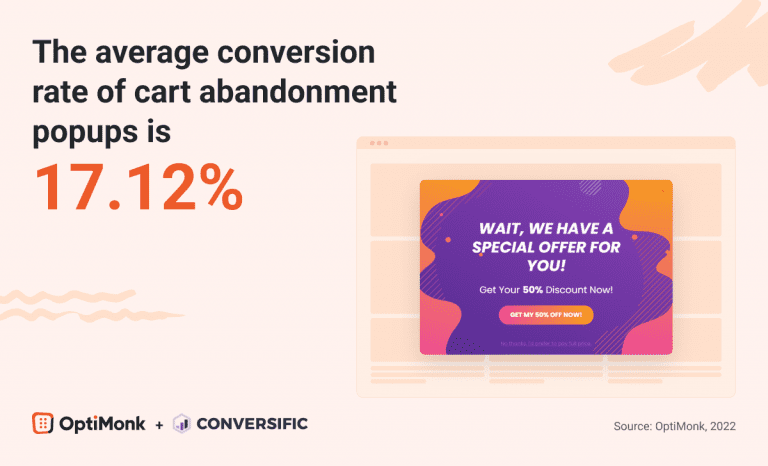
20. According to statistics, pop-ups of abandoned shopping carts can have 17.12% average conversion rates.
This means that almost 2 out of 10 people change their mind about buying a product or complete their purchase after looking at popups.
Must look: 27 Impactful Popup Statistics
21. Art and photography have a shopping cart abandonment rate of 55.1%, which comes in second in the 55.1% and second in lowest cart abandonment rates.
22. Almost $260 billion worth of revenue lost due to cart abandonment can be recovered. Making improvements can increase conversion rates.
23. Around 26% of shoppers choose some other retailer after abandoning their carts due to various issues or just buying it offline.
B2B
24. 57% of B2B buyers do not complete the process since the vendor’s checkout flow takes too long.
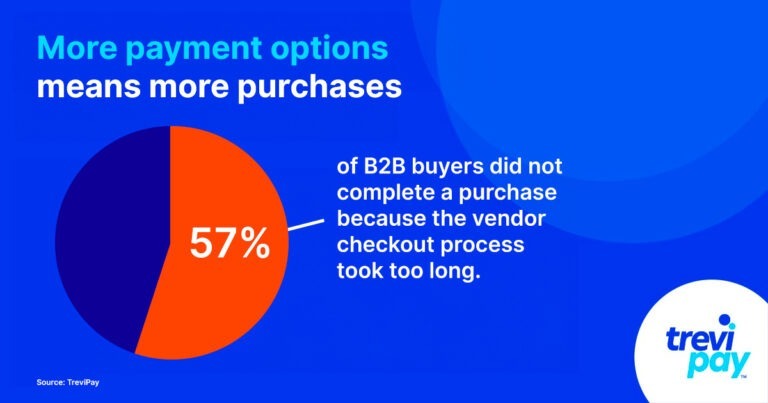
25. Lack of payment options can make 48% leave their carts unpurchased.
26. Around 90% of customers investigate payment options before purchasing, and 48% of B2B buyers do not complete their purchase since their preferred payment option was not present.
27. 74% of buyers would buy that product from another retailer, which provides their favorable payment options.
28. 50% of B2B buyers prefer payment options other than credit cards. This also includes ACH and automated clearing house payments.
29. Research suggests that 77% of B2B buyers require at least a day or longer to complete the onboarding process with a new vendor before they can proceed with making online purchases.
B2C
30. 93% of shoppers are encouraged to complete a purchase if free shipping is offered, and 58% add more to qualify for free shipping.
31. B2C companies that implement automated workflows to resolve shopping cart abandonment see a boost in the conversion rate of about 50%.
32. The cruise and ferry industry has the highest shopping cart abandonment rate, which is around 98%.
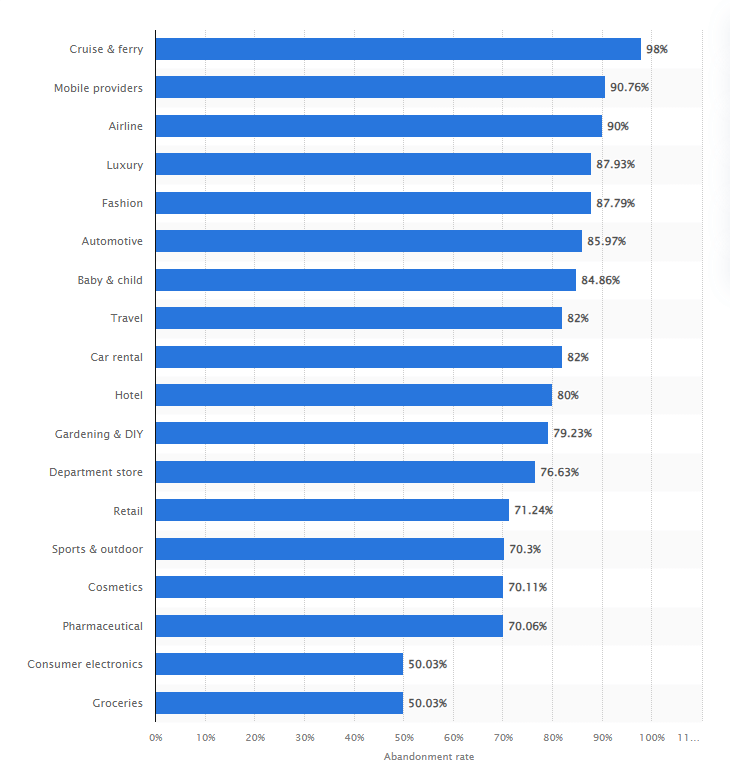
33. Products abandoned in carts can reach up to $4 trillion annually, which means retailers could have made a profit of $4 trillion combined.
Fashion
34. The highest e-commerce cart abandonment statistics is in the fashion industry, at 84.56%. Bringing travel to second and retail the third highest.
35. Travel bookings have a complicated checkout process due to their longer research and planning phase and, therefore, have a shopping cart abandonment rate of 81.7%.
36. The abandonment rate in the fashion and clothing industry is around 68.3%
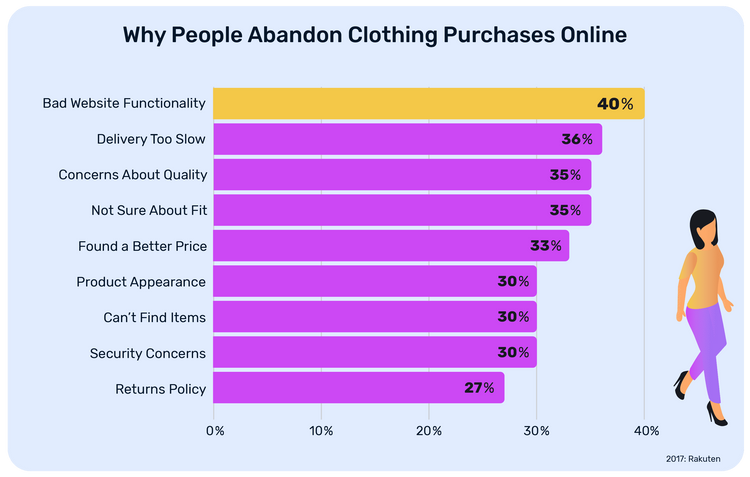
37. The fashion industry faces many challenges in reducing the shopping cart abandonment rate, which currently stands at 68.3%.
Consumers are presented with a vast array of styles, designs, colors, and sizes to choose from, making decisions highly subjective.
Must Read: 15 Inspiring Checkout Page Design Examples
38. As a result, clothing has one of the highest shopping cart abandonment statistics, with 40% of items left behind in shopping carts.
39. The Black Friday of 2020 saw a global cart abandonment rate of nearly 78%, with Spain having the highest rate.
40. Beauty and personal care has a cart abandonment rate of 82.87%. It has topped the list for the last 12 months.
41. Jewelry, accessories, fashion, and clothing have shopping cart abandonment issues of around 72 to 73%.
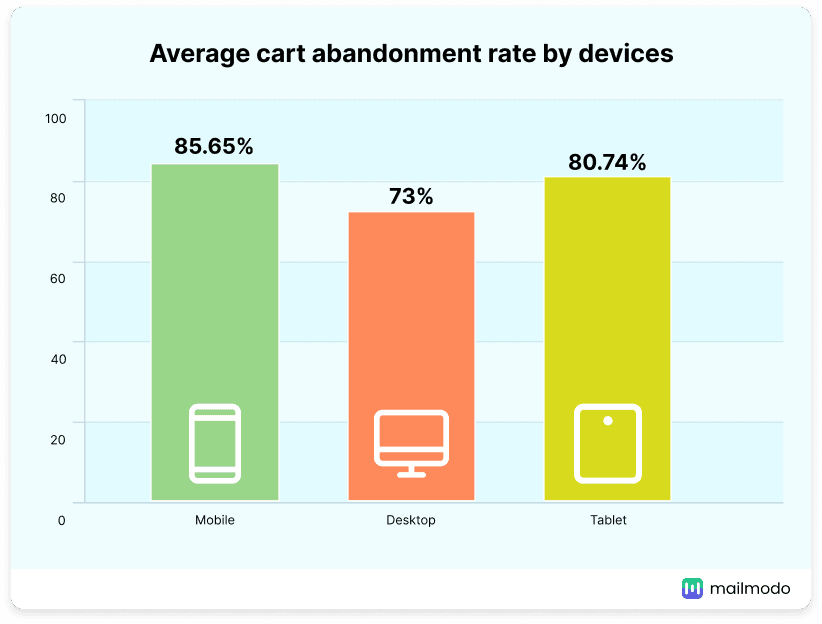
Tech
42. The Electronics industry has an 88.6% cart abandonment rate. Nearly 9 out of 10 shoppers abandon their carts when purchasing electronics online.
43. Tablets have an abandonment rate of 67.79%. It can be optimized with tablet-specific interactions such as stylus support.
44. 73% of people using desktops abandon their carts mid-purchase
Even though desktops are the most comfortable way to make purchases, it does not stop users from abandoning their carts.
Around 73% of consumers abandon their carts on the desktop, the lowest percentage compared to other devices.
45. The rate of mobile cart abandonment is the highest of all devices, accounting for about 85.65%. Mobile traffic is more than two-thirds of all e-commerce sessions.
Preventing Cart Abandonment
By proactively addressing certain areas and making optimization strategies, the cart abandonment rates can be decreased.
Must Read: 15 Real Strategies to Decrease Shopping Cart Abandonment
Product Page Clarity: Reducing Pre-Cart Hesitation
46. Product pages with high-quality images and videos can increase conversion rates by up to 30%.
47. 66% feel like a better return policy will make them more compelled to buy the product. Providing a generous return policy can reduce abandonment rates.
Customer Support as a Conversion Factor
48. You cannot completely avoid cart abandonment, but optimizing the checkout process can reduce your cart abandonment rate to 20%.
49. About 51% are more likely to make a purchase if they had better help throughout with customer support, such as live chat.
Wrap up
Every abandoned cart tells a story of an incomplete shopping journey. Whether it’s due to unexpected costs, complex checkout, or simply a change of heart, these lost sales represent a significant challenge and opportunity for e-commerce.
By understanding the factors that contribute to cart abandonment, businesses can take proactive steps to recover these lost sales and improve the overall customer experience.
Sources
Cloudways | Dynamic yield | Baymard | Invesp | Movingtrafficmedia




